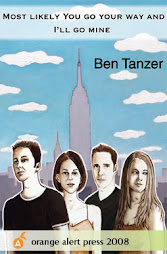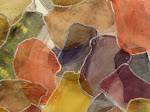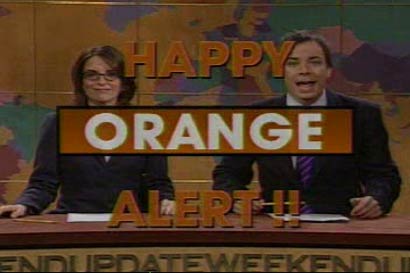
Doug Draime
"Fragments of last May. Somber and frozen in the pear fields."
Once a writer places pen to paper, regardless of the stage in their career, the words, the thoughts are frozen in time. The writer can record the period in time, the sentiment in the air, or just their thoughts in the moment. These words can be preserved in a book, hidden away in a stack of notebooks, or simple lost in the shuffle, but it is the wise writer who can find the right moment to pull out these burried thoughts and share them with the world.
Small press veteran and Indiana native, Doug Draime, has appeared in countless journals and zines dating back to the late sixities. He spent many creative years as a part of the notorious Los Angeles poetry scene, and has been and will continue to be an influential voice in the literary underground for many years to come.
Recently, Doug was kind enough to answer a few of my questions.
Orange Alert (OA): Your latest chapbook from Kendra Steiner Editions, Last May (1968), was written in 1968 in Los Angeles. What prompted you to pull this piece out of the notebook, and send it off to Bill Shute?
Doug Draime (DD): I was working on a chap with Bill containing poems written in, or about Oregon, where I've lived for the last 26 years. Last May was written on a quick and intense trip I'd made to Oregon in May of 1968, while I was still living in L.A. (1967-1981). Bill had sent me a copy of Hosho McCreesh's 37 Psalms, which I thought was outstanding. And the cadence and mood of his piece reminded me of Last May, which I'd actually forgotten about. Since it was about Oregon - more or less, though it could have been written anywhere - I sent it to Bill for the Oregon chap. But, he suggested doing it by itself as a chap, along with another poem (Experiments In Light). I wrote both poems and three or four others on a large paper grocery bag while on a mescaline trip on the coast of Oregon, one bright, beautiful morning watching the surf come and go. I typed it up when I got back to L.A. (Hollywood). I think I sent it out once or twice in the late '60's, or early 70's and never sent it out again, until I sent it to Bill, nearly 40 years later. At one point during the early '80's I revisited it and attempted to add a few more verses to it, but was never able to recapture the mood. That could have something to do with what I had digested before I wrote it.
OA: You have also contributed to one of KSE's Next Exit chapbooks. I am fascinated by this series. What were your initial thoughts on removing your name from the poems?
DD: Actually, I've done two Next Exits. One with Bill and another with Misti-Rainwater-Lites. Yeah, it's definitely a fascinating concept. I was a little uncomfortable at first. The ego dug in its heels and pitched a bitch. But, I had to let go of that horseshit and focus on the poems. I mean, it's not like a collaboration, where you're aware of what the other writer is contributing, where you work together on a certain mood, or style. The only theme was: towns and cities where you
have been, or lived. I took some older poems, revised them, and wrote a few new ones, changing the titles to reflect the theme. In the end I throughly enjoyed the process and the results. It was liberating in a certain sense, that no one knew ( except those people who know a lot about me)
- which poems were mine. I have to applaud the other writers in the series, and of course Bill Shute for the courage and risk taking, to involve themselves with such a project. It takes a ballsy and mature writer, confident of their chops. Most writers baulk at being part of any kind of project that doesn't give them a byline directly under or above their work. Which implies they're more concerned about seeing their name in print, than the writing itself.
OA: You have been involved in the small press for the last forty years. In your opinion, what has been the most significant change in the small press poet in that time?
DD: There really hasn't been that much change overall, as far as I can see. Other than, of course, the internet, which has provided a much larger audience for poets, which is a good thing. But the small press is still like a snake eating it's own tail: afraid to confront the status quo and stand against injustice and elitism, which I believe are the primary roles of art, of any kind, in society, especially in our current insanity. I find it difficult to understand how writers and artists can
live in todays world without a murmur of truth, without a word of outrage, or protest, or compassion. And those kind of writers (the non-confrontational ones) are mainly the ones who dominate the small press, as well as academic writing. They are concerned about their own celebrity, blowing their own horns, patting each other on the back, and saying not much of anything about anything. Though, I must say, we all have the right to write about anything we please, and a lot of writers in the small press, like academic writers, say nothing is interesting and beautiful ways. But true art must liberate and enlighten, free the spirit from it's bonds of delusions, rip the heart from the vampire..
"Fragments of last May. Somber and frozen in the pear fields."
Once a writer places pen to paper, regardless of the stage in their career, the words, the thoughts are frozen in time. The writer can record the period in time, the sentiment in the air, or just their thoughts in the moment. These words can be preserved in a book, hidden away in a stack of notebooks, or simple lost in the shuffle, but it is the wise writer who can find the right moment to pull out these burried thoughts and share them with the world.
Small press veteran and Indiana native, Doug Draime, has appeared in countless journals and zines dating back to the late sixities. He spent many creative years as a part of the notorious Los Angeles poetry scene, and has been and will continue to be an influential voice in the literary underground for many years to come.
Recently, Doug was kind enough to answer a few of my questions.
Orange Alert (OA): Your latest chapbook from Kendra Steiner Editions, Last May (1968), was written in 1968 in Los Angeles. What prompted you to pull this piece out of the notebook, and send it off to Bill Shute?
Doug Draime (DD): I was working on a chap with Bill containing poems written in, or about Oregon, where I've lived for the last 26 years. Last May was written on a quick and intense trip I'd made to Oregon in May of 1968, while I was still living in L.A. (1967-1981). Bill had sent me a copy of Hosho McCreesh's 37 Psalms, which I thought was outstanding. And the cadence and mood of his piece reminded me of Last May, which I'd actually forgotten about. Since it was about Oregon - more or less, though it could have been written anywhere - I sent it to Bill for the Oregon chap. But, he suggested doing it by itself as a chap, along with another poem (Experiments In Light). I wrote both poems and three or four others on a large paper grocery bag while on a mescaline trip on the coast of Oregon, one bright, beautiful morning watching the surf come and go. I typed it up when I got back to L.A. (Hollywood). I think I sent it out once or twice in the late '60's, or early 70's and never sent it out again, until I sent it to Bill, nearly 40 years later. At one point during the early '80's I revisited it and attempted to add a few more verses to it, but was never able to recapture the mood. That could have something to do with what I had digested before I wrote it.
OA: You have also contributed to one of KSE's Next Exit chapbooks. I am fascinated by this series. What were your initial thoughts on removing your name from the poems?
DD: Actually, I've done two Next Exits. One with Bill and another with Misti-Rainwater-Lites. Yeah, it's definitely a fascinating concept. I was a little uncomfortable at first. The ego dug in its heels and pitched a bitch. But, I had to let go of that horseshit and focus on the poems. I mean, it's not like a collaboration, where you're aware of what the other writer is contributing, where you work together on a certain mood, or style. The only theme was: towns and cities where you
have been, or lived. I took some older poems, revised them, and wrote a few new ones, changing the titles to reflect the theme. In the end I throughly enjoyed the process and the results. It was liberating in a certain sense, that no one knew ( except those people who know a lot about me)
- which poems were mine. I have to applaud the other writers in the series, and of course Bill Shute for the courage and risk taking, to involve themselves with such a project. It takes a ballsy and mature writer, confident of their chops. Most writers baulk at being part of any kind of project that doesn't give them a byline directly under or above their work. Which implies they're more concerned about seeing their name in print, than the writing itself.
OA: You have been involved in the small press for the last forty years. In your opinion, what has been the most significant change in the small press poet in that time?
DD: There really hasn't been that much change overall, as far as I can see. Other than, of course, the internet, which has provided a much larger audience for poets, which is a good thing. But the small press is still like a snake eating it's own tail: afraid to confront the status quo and stand against injustice and elitism, which I believe are the primary roles of art, of any kind, in society, especially in our current insanity. I find it difficult to understand how writers and artists can
live in todays world without a murmur of truth, without a word of outrage, or protest, or compassion. And those kind of writers (the non-confrontational ones) are mainly the ones who dominate the small press, as well as academic writing. They are concerned about their own celebrity, blowing their own horns, patting each other on the back, and saying not much of anything about anything. Though, I must say, we all have the right to write about anything we please, and a lot of writers in the small press, like academic writers, say nothing is interesting and beautiful ways. But true art must liberate and enlighten, free the spirit from it's bonds of delusions, rip the heart from the vampire..
OA: What type of an impact do you think "new media" (i.e. blogs, on-line lit zine, etsy, lulu, etc) has had on the small press and the writer in general?
DD: Well, that's a loaded question. I think the internet, in general, has had a positive impact on the small press. Though, it has also been responsible for putting a lot of god awful crap in our faces. I frankly, don't understand blogs. Meaning, I don't get how people have all this time on their hands, to shoot the shit and debate, promote, and "network". Most of them are just TMI to me; I don't need to know all that stuff. There are some absolutely incredible web sites around, with some of the best writing being produced in this country and in the world. And just to contradict myself a little, adding a bit to the answer to your last question. I think the writing in the small press, is by in large much, much better that it has ever been. That's been brought about by the two-headed monster of the internet.
OA: If I was asked to name the one writer who has had the most influence over the current state of poetry, I would have to say Charles Bukowski. Why do you think his work has had such huge impact on so many young writers?
DD: Bukowski was and is a very accessible writer. A great but limited writer. Limited by the fact that his experience was, or appeared to be always the same. He did not experiment or speculate with his writing. He wrote directly about his life, even if he exaggerated at times, it was always very compelling. He could make the most mundane things interesting and powerful. The mass appeal that he experienced before his death, as well as the icon status that he and his writing have achieved since his death in 1994, is mainly because of the promotion and money of his publisher John Martin. How many "small press" writers can you name that fill the shelves of major and minor bookstores, other than Bukowski? He's a marketing phenomenon! The man's dead and he sells more poetry books than 10 living poets combined. None of the writers that emulate, or imitate him can hold a candle to him. And as long as they "follow in his footsteps" they will never be their own writers. Most of them couldn't live the life he lived for a week
without collapsing. His writing and inspiration came from hard times, desperate times, on the streets, on the bum. Many writers, including me, have gone through a lot of hard times that might even equal Buk's, but none of us have been so prolific or just down right lucky.
DD: Well, that's a loaded question. I think the internet, in general, has had a positive impact on the small press. Though, it has also been responsible for putting a lot of god awful crap in our faces. I frankly, don't understand blogs. Meaning, I don't get how people have all this time on their hands, to shoot the shit and debate, promote, and "network". Most of them are just TMI to me; I don't need to know all that stuff. There are some absolutely incredible web sites around, with some of the best writing being produced in this country and in the world. And just to contradict myself a little, adding a bit to the answer to your last question. I think the writing in the small press, is by in large much, much better that it has ever been. That's been brought about by the two-headed monster of the internet.
OA: If I was asked to name the one writer who has had the most influence over the current state of poetry, I would have to say Charles Bukowski. Why do you think his work has had such huge impact on so many young writers?
DD: Bukowski was and is a very accessible writer. A great but limited writer. Limited by the fact that his experience was, or appeared to be always the same. He did not experiment or speculate with his writing. He wrote directly about his life, even if he exaggerated at times, it was always very compelling. He could make the most mundane things interesting and powerful. The mass appeal that he experienced before his death, as well as the icon status that he and his writing have achieved since his death in 1994, is mainly because of the promotion and money of his publisher John Martin. How many "small press" writers can you name that fill the shelves of major and minor bookstores, other than Bukowski? He's a marketing phenomenon! The man's dead and he sells more poetry books than 10 living poets combined. None of the writers that emulate, or imitate him can hold a candle to him. And as long as they "follow in his footsteps" they will never be their own writers. Most of them couldn't live the life he lived for a week
without collapsing. His writing and inspiration came from hard times, desperate times, on the streets, on the bum. Many writers, including me, have gone through a lot of hard times that might even equal Buk's, but none of us have been so prolific or just down right lucky.
OA: What can you tell us about your forthcoming collection, Dancing On The Skids?
DD: It contains poems written from 1967 to 2000. I attempted to send Brian Fugett and Karl Koweski, the publishers, a diverse range of stuff, which is really the way I always do it. Though, some may disagree, I don't have a style of writing, really. I just write and what comes out is what comes out. My mind goes everywhere, so my writing goes everywhere. I've never been able to write under the constrains of style. Writing poems in the same way, in the same mood, about the same kind of experiences has been impossible for me. Freedom is very important to me, freedom of every sort. And my writing reflects that. When I first begun writing seriously, I always heard that you had to have a "style" in order for people to recognize your name by your style. I mean, most poets do it that way. But Picasso said words to the effect, that creating work in the same way time after time limits and even destroys true creatively. And the goal should be the work itself, not others recognizing your name by the way you created something. So, I have to agree with old Pablo, he was a really smart dude.
OA: What's next for Doug Draime?
DD: More of the same, no doubt. But I'm trying to focus on larger stuff, short stories and maybe a couple of novels. I've written three novels in my life, but they were shit, so I threw them away. Also, I'd like to write more plays. Working on one now that I've been working on for at least 15 years, and I have a few one act plays and short dialogs pieces , that try to peddle now and then. I'm in my 60's, so if my ticket isn't cancelled, maybe I can live up to what I'm shooting my mouth off about here.
Bonus Questions:
OA: Coffee? If yes, what is your favorite type of coffee and where is your favorite coffee spot?
DD: I drink lattes now and then. but mainly I'm a tea drinker. They have great lattes at a chain of drive-thrus here in Oregon, called Dutch Bros.
OA: There seems to be a historical connection between the poet and the musician. What are your thoughts on that, and what is your favorite type of music?
DD: The first thing I ever wrote was a rock song lyric when I was around 14. Then later when I lived in L.A. I wrote with a couple different musicians. Music has always
been an inspiration to me as a writer. Bob Dylan, Leonard Cohen, Miles Davis, Hank Williams, Nina Simone, Mozart, and others have inspired and influenced poems and short stories I've written. My favorite type of music? Uh, um, well, I like it all. Jazz, Rock, Heavy Metal, Folk, Country, Blue Grass, Classical, Punk, Hip Hop, you name it. Right now I'm listening to an old Pearl Jam CD.
DD: It contains poems written from 1967 to 2000. I attempted to send Brian Fugett and Karl Koweski, the publishers, a diverse range of stuff, which is really the way I always do it. Though, some may disagree, I don't have a style of writing, really. I just write and what comes out is what comes out. My mind goes everywhere, so my writing goes everywhere. I've never been able to write under the constrains of style. Writing poems in the same way, in the same mood, about the same kind of experiences has been impossible for me. Freedom is very important to me, freedom of every sort. And my writing reflects that. When I first begun writing seriously, I always heard that you had to have a "style" in order for people to recognize your name by your style. I mean, most poets do it that way. But Picasso said words to the effect, that creating work in the same way time after time limits and even destroys true creatively. And the goal should be the work itself, not others recognizing your name by the way you created something. So, I have to agree with old Pablo, he was a really smart dude.
OA: What's next for Doug Draime?
DD: More of the same, no doubt. But I'm trying to focus on larger stuff, short stories and maybe a couple of novels. I've written three novels in my life, but they were shit, so I threw them away. Also, I'd like to write more plays. Working on one now that I've been working on for at least 15 years, and I have a few one act plays and short dialogs pieces , that try to peddle now and then. I'm in my 60's, so if my ticket isn't cancelled, maybe I can live up to what I'm shooting my mouth off about here.
Bonus Questions:
OA: Coffee? If yes, what is your favorite type of coffee and where is your favorite coffee spot?
DD: I drink lattes now and then. but mainly I'm a tea drinker. They have great lattes at a chain of drive-thrus here in Oregon, called Dutch Bros.
OA: There seems to be a historical connection between the poet and the musician. What are your thoughts on that, and what is your favorite type of music?
DD: The first thing I ever wrote was a rock song lyric when I was around 14. Then later when I lived in L.A. I wrote with a couple different musicians. Music has always
been an inspiration to me as a writer. Bob Dylan, Leonard Cohen, Miles Davis, Hank Williams, Nina Simone, Mozart, and others have inspired and influenced poems and short stories I've written. My favorite type of music? Uh, um, well, I like it all. Jazz, Rock, Heavy Metal, Folk, Country, Blue Grass, Classical, Punk, Hip Hop, you name it. Right now I'm listening to an old Pearl Jam CD.
To purchase Doug's latest chapbook, Last May (1968), visit Kendra Steiner Editions.
+by+Nick+Volkert).jpg)





















5 comments:
Nice work again Jason. You are the man.
Nice interview.
It's high time we all do some serious reading of Draime's work. It can be found all over the internet--it's a mind-bending, innovative, & boundless body of work.
good read.
thanks to jason and doug for the illumination.
and man, that draime can get the words down...
Jason,
Great job w/ the Doug Draime interview. Since the 70's I've always awaited his next slice of poetic vision and sane-perspective-in-an-insane-world from the West Coast.
Let's hope the interview brings his always exciting and never predictable work to an even larger audience. A google search of Doug's name should bring up dozens of online poetry sites featuring his work.
That Doug has been working steadily for four decades should be an inspiration for us all.
Good interview with one of the best poets in the small press.
Post a Comment